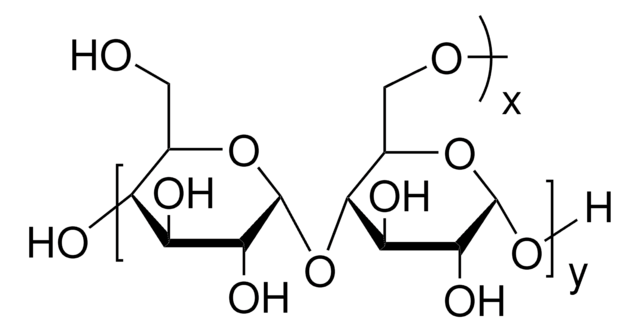69293
Sucralosa
≥98.0% (HPLC)
Sinónimos:
1,6-Dicloro-1,6-didesoxi-β-D-fructofuranosil-4-cloro-4-desoxi-α-D-galactopiranósido, E955, Triclorosacarosa
About This Item
Productos recomendados
Quality Level
assay
≥98.0% (HPLC)
form
powder
optical activity
[α]/D 86.0±2.0°, c = 1 in H2O
sweetness
600 × sucrose
color
white to off-white
useful pH range
6-8 (20 °C, 100 g/L)
mp
114.5 °C ((238.1 °F ) - OECD Test Guideline 102)
solubility
~300 g/L at 25 °C (77 °F)
SMILES string
OC[C@H]1O[C@H](O[C@]2(CCl)O[C@H](CCl)[C@@H](O)[C@@H]2O)[C@H](O)[C@@H](O)[C@H]1Cl
InChI
1S/C12H19Cl3O8/c13-1-4-7(17)10(20)12(3-14,22-4)23-11-9(19)8(18)6(15)5(2-16)21-11/h4-11,16-20H,1-3H2/t4-,5-,6+,7-,8+,9-,10+,11-,12+/m1/s1
InChI key
BAQAVOSOZGMPRM-QBMZZYIRSA-N
¿Está buscando productos similares? Visita Guía de comparación de productos
Application
Biochem/physiol Actions
Other Notes
Storage Class
11 - Combustible Solids
wgk_germany
WGK 2
flash_point_f
Not applicable
flash_point_c
Not applicable
ppe
Eyeshields, Gloves, type N95 (US)
Certificados de análisis (COA)
Busque Certificados de análisis (COA) introduciendo el número de lote del producto. Los números de lote se encuentran en la etiqueta del producto después de las palabras «Lot» o «Batch»
¿Ya tiene este producto?
Encuentre la documentación para los productos que ha comprado recientemente en la Biblioteca de documentos.
Los clientes también vieron
Nuestro equipo de científicos tiene experiencia en todas las áreas de investigación: Ciencias de la vida, Ciencia de los materiales, Síntesis química, Cromatografía, Analítica y muchas otras.
Póngase en contacto con el Servicio técnico












